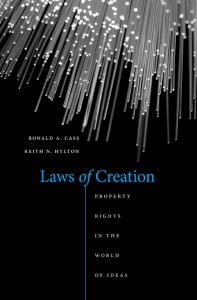Are copyright protections anti-consumer and anti-innovation? And is copyright law currently broken?
No, say legal scholars Ronald A. Cass (Dean Emeritus, Boston University School of Law, and President, Cass & Associates, PC) and Keith N. Hylton (Honorable Paul J. Liacos Professor of Law at Boston University School of Law). And the steady drumbeat of opinions saying otherwise — especially from academia — led the two to offer a defense of intellectual property and its legal framework.
In their new book, Laws of Creation: Property Rights in the World of Ideas, Cass and Hylton provide an overview of the economic foundations of intellectual property. In doing so, they reject the “zero-sum” approach to IP law that has steadily gained acceptance by scholars — where any gain to rights holders is seen as a loss to downstream users and the public. The two instead look at intellectual property in the same way as any other property rights. Generally speaking, these rights “make society better off by increasing incentives to find or create property, to preserve and promote property, and to allocate its uses wisely.”
Their approach is explicitly utilitarian. So long as the dynamic benefits of intellectual property protection outweigh the static costs incurred, such protection is beneficial to society. Cass and Hylton conclude that current IP law succeeds in this regard.
The bulk of the book is a theoretical analysis of these static and dynamic effects of the four major areas of intellectual property law: patent, trade secrets, copyright, and trademark. Two chapters are devoted to examining issues at the intersection of intellectual property regimes and tensions between intellectual property law and antitrust law.
Cass and Hylton conclude with a discussion examing their motivations for writing the book, namely, the “need to regain a more balanced and reasonable perspective on the way our laws treat the world of ideas.” As noted above, the book challenges the “zero sum” view of IP that has increasingly found favor among academics. This has led to a skepticism about IP rights. One need only spend a few minutes online to realize that this skepticism has spilled out of the academy and permeates many discussions of technology and media issues. The authors speculate about some of the possible causes for this view gaining ground in recent decades, but ultimately their book is most useful to counter the erroneous zero sum approach.
Critics might point out that the book has little to say that is negative of intellectual property rights. Surely the authors are looking through rose colored glasses! But Cass and Hylton are careful to point out that their discussion does not imply that each aspect of IP law is unimpeachable. And the book intentionally takes a birds-eye view of policy, meaning that there is little attention devoted to specific issues or concerns. IP, like any other area of the law, can always benefit from tweaking and improvement, but it is not as irredeemably broken as its critics make it out to be. This approach makes the book especially timely as Congress looks to begin a comprehensive review of the Copyright Act.
The book would seem to be most valuable to law students and those looking for an introduction to intellectual property law. Legal practitioners and others with a working knowledge of copyright may not find anything particularly novel between the covers of Laws of Creation; while the book is a straightforward and commonsense look at IP, much of it may be familiar territory. But the fact that its reasonable and rational approach is so contrary to much modern IP scholarship makes it worth a read and a space on any intellectual property wonk’s bookshelf.

Looks like a great book that has come out at the right time. I’d be especially interested in the chapters on IP and antitrust–a topic that I’ve taken a recent interest in. Professor Adam Mossoff has a great review of the book that might also interest people: http://www.libertylawsite.org/book-review/the-dollars-and-sense-of-intellectual-property/ Mossoff notes how the authors pick up on a theme that he has recently written about, namely, how IP is not only about the incentive to create but also about the incentive to commercialize. See http://papers.ssrn.com/sol3/papers.cfm?abstract_id=2243264
Given that an economic analysis of IP would require knowing the unknowable and quantifying the unquantifiable, I’m dubious that the utilitarian model of IP could ever be proved with any certainty. Mossoff says this more eloquently than I ever could: “Although the use of scientific concepts from economics and other social sciences makes utilitarianism sound determinate in the abstract, the omnipresent deficit of empirical data that is required to prove with robust conclusions that specific doctrines and their application in specific cases is efficient or not indicates that such claims to determinacy are a false promise.” Still, the book sounds promising and well worth a read. Thanks for the review!
Incentive to commercialize can be boiled down to “Incentive to make public” at all.
What’s to keep me from keeping all my creations to myself; if i know that as soon as anyone knows about it, it ceases to belong to me?
Copyright is my (the proverbial ‘my’, ‘we’, ‘us’) incentive to share our creations with the world, thus contributing to the advancement of society.